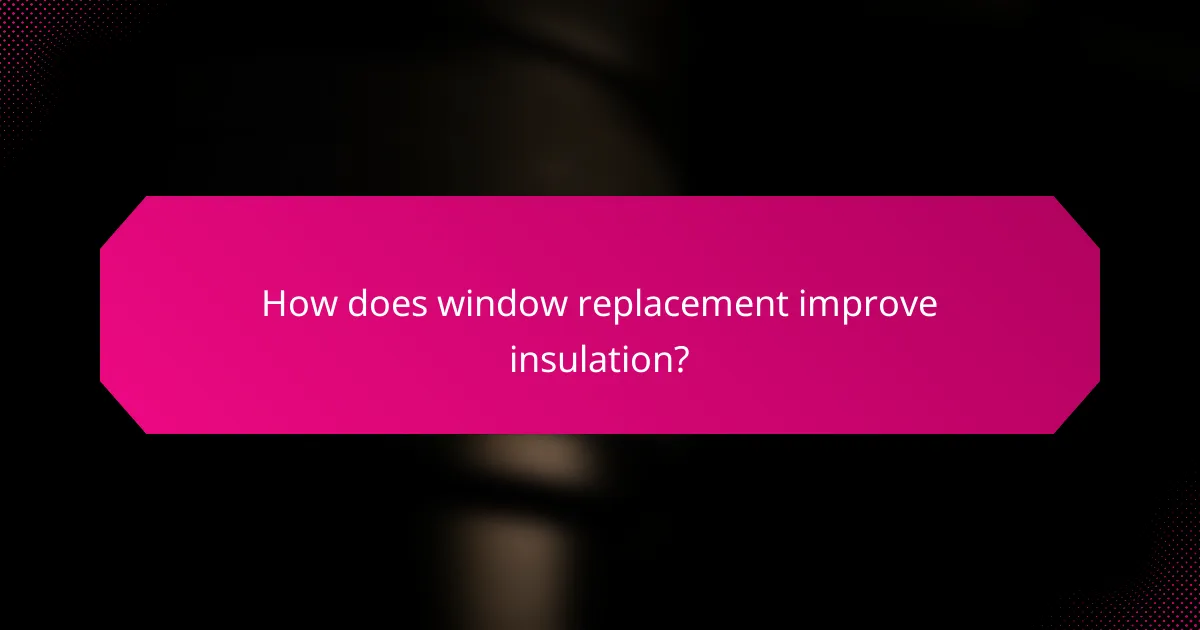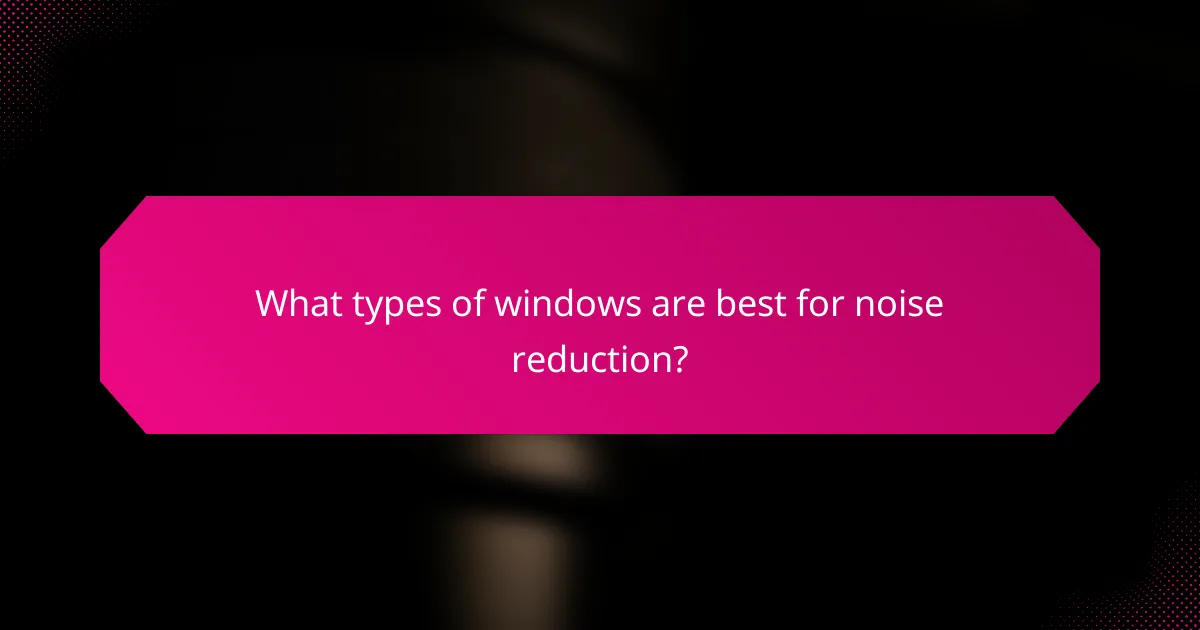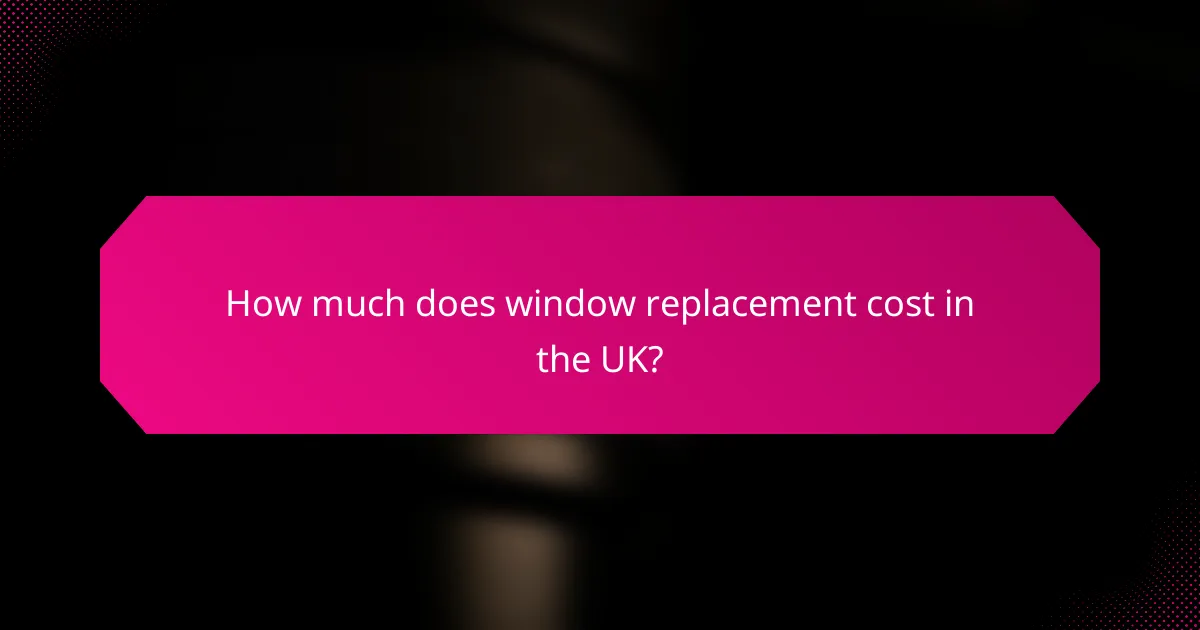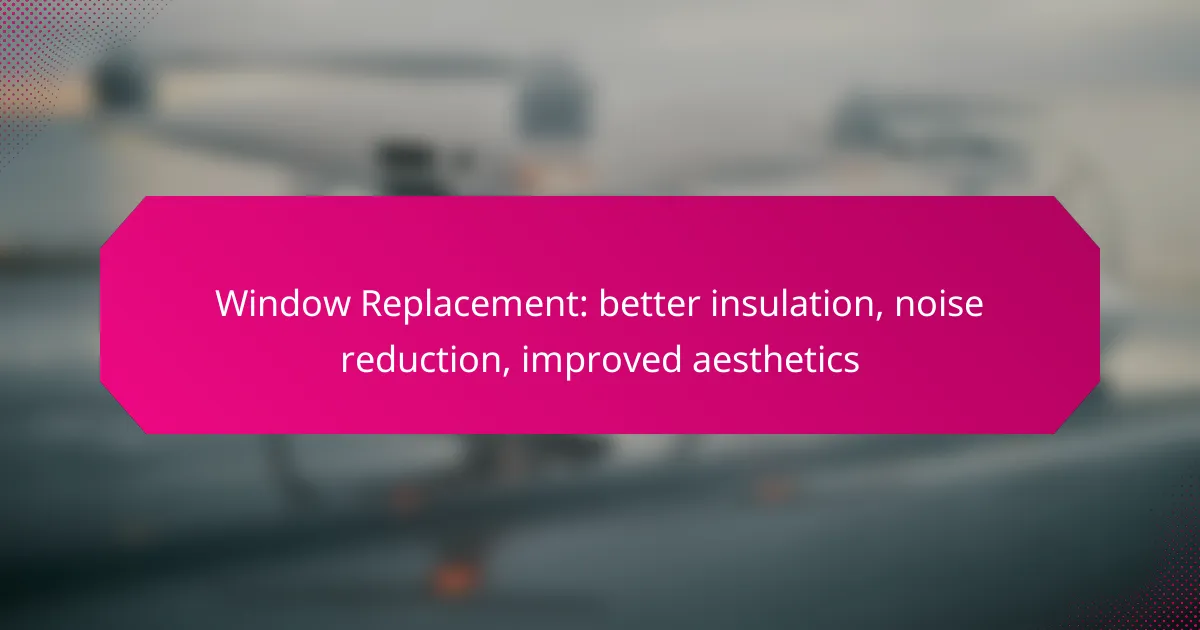Window replacement offers numerous benefits, including enhanced insulation, reduced noise levels, and improved aesthetics. By upgrading your windows, you can achieve greater energy efficiency, create a more tranquil living space, and elevate the visual appeal of your home.

What are the benefits of window replacement in the UK?
Window replacement in the UK offers significant advantages, including better insulation, noise reduction, and improved aesthetics. Upgrading your windows can enhance energy efficiency, create a quieter living environment, and elevate the overall appearance of your home.
Improved insulation
Replacing old windows with modern, energy-efficient models can greatly enhance insulation. Double or triple glazing options trap air between panes, reducing heat loss and keeping homes warmer during colder months.
When considering insulation, look for windows with a low U-value, which indicates better thermal performance. In the UK, energy-efficient windows can help lower heating bills by up to 20-30% over time.
Noise reduction
New windows can significantly decrease outside noise, providing a more peaceful indoor environment. Acoustic glazing options are specifically designed to minimize sound transmission, making them ideal for homes in busy urban areas.
For effective noise reduction, consider windows with thicker glass or laminated options, which can block a wider range of frequencies. This can be particularly beneficial for homes near roads or railways.
Enhanced aesthetics
Window replacement can dramatically improve the visual appeal of your home. Modern designs come in various styles, colors, and finishes, allowing homeowners to match their windows to their architectural preferences.
Investing in new windows not only boosts curb appeal but can also increase property value. Consider choosing styles that complement your home’s design while ensuring they meet local building regulations and aesthetic guidelines.

How does window replacement improve insulation?
Window replacement significantly enhances insulation by utilizing advanced materials and technologies that minimize heat transfer. This results in a more energy-efficient home, reducing heating and cooling costs while improving overall comfort.
Energy-efficient materials
Modern windows are crafted from energy-efficient materials such as vinyl, fiberglass, and low-emissivity (Low-E) glass. These materials are designed to reduce thermal bridging, which occurs when heat escapes through the frame. Choosing windows with these materials can lead to energy savings of up to 30% compared to older models.
When selecting windows, look for those with a high R-value, which indicates better insulation performance. Additionally, consider options that are certified by energy efficiency programs, such as ENERGY STAR, which can help you identify the most effective products available in your region.
Double or triple glazing
Double or triple glazing involves using two or three panes of glass with insulating gas fills, such as argon or krypton, in between. This design significantly reduces heat loss and noise infiltration compared to single-pane windows. Homes with double or triple glazing can experience a noticeable drop in energy bills and improved indoor comfort.
When choosing between double and triple glazing, consider your local climate. In colder regions, triple glazing may provide additional benefits, while double glazing is often sufficient in milder climates. Always check the U-factor rating, which measures the window’s overall thermal performance, to ensure you select the best option for your needs.

What types of windows are best for noise reduction?
Windows designed specifically for noise reduction typically feature multiple panes and specialized materials that help block sound. Acoustic windows and those with soundproofing features are among the best options for minimizing noise intrusion.
Acoustic windows
Acoustic windows are engineered to reduce sound transmission significantly. They usually consist of two or more panes of glass with varying thicknesses, which disrupt sound waves and prevent them from passing through easily.
When selecting acoustic windows, look for models that meet specific sound transmission class (STC) ratings. Higher STC ratings indicate better sound insulation, with effective acoustic windows often rated in the mid to high 30s or even 40s.
Soundproofing features
Soundproofing features in windows may include laminated glass, which has a layer of plastic sandwiched between two glass panes, enhancing sound dampening. Additionally, windows with thicker frames and airtight seals further reduce noise leakage.
Consider the installation of soundproofing window films or acoustic caulking to improve existing windows. These options can be cost-effective and provide noticeable noise reduction without the need for complete window replacement.

What are the aesthetic options for window replacement?
Window replacement offers a variety of aesthetic options that can enhance the overall look of your home. Choices range from modern designs to customizable frames, allowing homeowners to select styles that fit their personal taste and architectural needs.
Modern designs
Modern window designs often feature sleek lines and minimalistic frames, which can create a contemporary look for your home. Options such as large picture windows or floor-to-ceiling glass can maximize natural light and provide unobstructed views, making spaces feel larger and more open.
When considering modern designs, think about energy efficiency and materials. Double or triple-glazed glass can improve insulation while maintaining a stylish appearance. Look for windows that meet local energy standards to ensure you are making a sustainable choice.
Customizable frames
Customizable frames allow homeowners to select colors, materials, and finishes that match their home’s exterior. Options include wood, vinyl, and aluminum, each offering different aesthetic and maintenance benefits. For instance, wood frames provide a classic look but may require more upkeep compared to vinyl.
When choosing customizable frames, consider the architectural style of your home. A traditional home may benefit from ornate wood frames, while a modern home might look best with sleek, minimalist designs. Always check with local suppliers for available options and pricing to ensure you stay within your budget.

What factors should be considered when choosing replacement windows?
When selecting replacement windows, consider material durability, energy ratings, and local building regulations. These factors will significantly impact the windows’ performance, longevity, and compliance with local codes.
Material durability
Material durability is crucial for ensuring that replacement windows withstand environmental conditions over time. Common materials include vinyl, wood, fiberglass, and aluminum, each offering different levels of resistance to moisture, temperature changes, and pests.
For instance, vinyl windows are known for their low maintenance and resistance to rot, while wood windows provide aesthetic appeal but may require regular upkeep. Assess the climate in your area to choose a material that will perform best under local conditions.
Energy ratings
Energy ratings, such as the U-factor and Solar Heat Gain Coefficient (SHGC), indicate how well windows insulate and manage heat transfer. A lower U-factor means better insulation, while a lower SHGC indicates reduced heat gain from sunlight.
Look for windows with Energy Star certification, which signifies compliance with energy efficiency standards. Depending on your region, energy-efficient windows can lead to savings on heating and cooling costs, often recouping their initial investment over time.
Local building regulations
Local building regulations dictate specific requirements for window installations, including energy efficiency standards, safety codes, and structural integrity. Familiarize yourself with these regulations to ensure compliance and avoid potential fines or issues during inspections.
Consult with local building authorities or a qualified contractor to understand the necessary permits and codes applicable in your area. This step is essential for ensuring that your replacement windows meet all legal requirements and function effectively in your home.

How much does window replacement cost in the UK?
The cost of window replacement in the UK typically ranges from £200 to £1,000 per window, depending on factors like the type of window, materials used, and installation complexity. Homeowners should consider both the upfront costs and potential long-term savings from improved energy efficiency and aesthetics.
Average price range
On average, homeowners can expect to pay between £400 and £800 per window for standard double-glazed units. This price can vary based on the window style, such as casement, sash, or tilt-and-turn, as well as the frame material, including uPVC, wood, or aluminum.
For larger or more complex installations, such as bay or bow windows, costs can rise significantly, often exceeding £1,000. It’s advisable to obtain multiple quotes from reputable installers to ensure competitive pricing and quality service.
Additionally, consider potential extra costs for features like enhanced security, decorative glass, or energy-efficient ratings, which can provide long-term savings on heating bills. Always check for any available grants or incentives that may help offset the costs of window replacement in your area.
